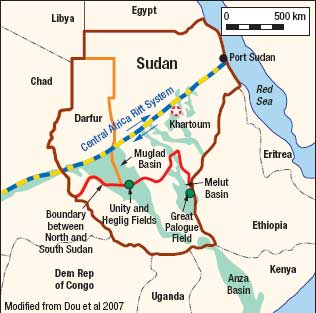What's new in exploration
Oil and politics in Sudan Two million people have been killed in the civil war in Sudan since 1982. Seventy percent of Sudan’s total revenue comes from oil, so the struggle is mostly about oil. The fighting is between mixed racial groups in the north led by an Arab minority, and black tribal groups in the south. A peace agreement temporarily ended the civil war in 2005 and established separate autonomous regions in North and South Sudan that would share production until a secession referendum can be held in 2011. The peace agreement has now largely disintegrated. The more recent conflict between North Sudan and its southwestern state of Darfur is complex, but it is also mostly about oil. Rebel groups in Darfur want to create a third state in Sudan, but need the revenue from oil fields within their borders. Many undeveloped areas of Sudan, including much of Darfur and the adjacent state of Abyei, have large probable oil reserves. The genocide in Darfur is part of North Sudan’s strategy to prevent formation of a third Sudanese state, and also to avert secession of the south. It has armed Janjaweed militias to systematically kill and dislocate the tribal population in Darfur and Abyei. Recently, Darfur rebel groups have retaliated by attacking oil fields. Several Chinese oil field workers were kidnapped and killed.
CNPC, the Chinese national oil company (NOC), and its partners Petronas Caragali, the Malaysian NOC, and ONGC, the Indian NOC, are the chief players in the development and production of Sudan’s oil fields. Chevron and Shell discovered the Unity and Heglig oil fields in the Muglad Basin (Figure 1) during the initial phase of exploration in Sudan from 1975-1985, but they exited because of civil strife. Combined recoverable reserves from these fields may exceed one billion barrels of oil, and current production is approximately 500,000 bopd. The oil is transported through a 994-mi pipeline to the Port Sudan terminal on the Red Sea. CNPC discovered oil in the adjacent Melut Basin in 2002 at the Great Palogue Field. This discovery, along with several smaller nearby fields, has recoverable reserves of approximately 900 million barrels of oil, providing an additional 500,000 bopd to the production from the Muglad Basin. The oil-producing basins of the southern Sudan are part of the Central Africa rift system that extends through Chad to the Benue Trough in Nigeria. Three distinct periods of extension and rifting resulted in deposition of source and reservoir lithologies, and formation of structural traps. Early Cretaceous (Valanginian-Albian) rifting produced extensive lacustrine deposits in subsiding troughs that included thick organic-rich, oil-prone source rocks. Post-rift subsidence and burial during the middle Miocene put source rocks into the oil generation window. While the extensional and depositional histories of the sedimentary basins in Sudan were similar, the factors that control the petroleum geology in each basin are somewhat different. In the Muglad Basin, the principal reservoirs are found in the Cretaceous Bentiu (Late Albian-Cenomanian) and Darfur (Turonian-late Maastrictian) Formations. Vertical seals are found in both Cretaceous and Tertiary strata. In the Melut Basin, the main reservoirs are within the Tertiary Samma and Yabus formations (Paleocene-Eocene).Both basins produce undersaturated oils with high wax content and high pour points, but heavy oils are also found in the Melut Basin. Sudan is a failed state that has experienced civil war and profound social disorder for most of its history since gaining independence from Great Britain in 1956. The conflict in Sudan is about many complex issues of race, religion, famine, legacies of British colonial rule and the Arab slave trade in that region, but the focus today is revenue from oil. The recently publicized genocide in Darfur is part of a broader conflict. While the Islamist government and its Janjaweed militias may be the greatest villains in the struggle, there are excesses on all sides caused by desperation and greed. In Sudan, we see a new dimension for state oil companies that are now operating outside of their home countries. They are the only entities apparently capable of doing business in the political chaos that exists in Sudan, and amid the international controversy that surrounds it. The NOCs are not as vulnerable as public companies to public opinion, and are not bound by the international corrupt practices laws that apply to most North American and European companies. Chevron and Shell did the hard work of exploration, but the NOCs are reaping the profits. The warring factions in Sudan need income from oil and the foreign companies that operate there must sell arms as a prerequisite to continuing business with North Sudan. Some international oil companies like ExxonMobil and Shell have decided to reduce their exposure to international exploration because they cannot obtain a position with NOCs in their home states. Perhaps one of the lessons from Sudan is that it may become increasingly difficult for them to compete with NOCs anywhere in the world, because the NOCs have greater flexibility to work where the oil is found. Thanks to Anthony Reso for suggesting the topic of Sudan for this column. .
|
||||||||





